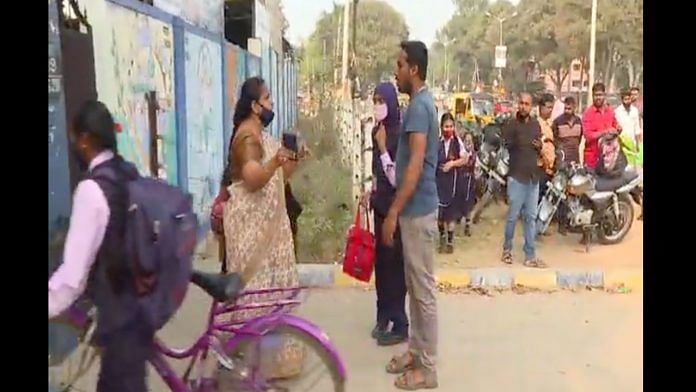The mind-boggling rate at which information can travel through machines and humans are both a blessing and a curse. Blessing if the information brings out the best in the sender and receiver. Curse if the two sides are estranged. In the Indian political discourse, religion has for long become a strong currency in the power structure. Religious issues in India travel at the fastest pace and, largely, create further communal divisions and tensions.
The power of information to generate hate and its speed can become a major security threat. In the existing national political context, creating rifts between religious communities has become easier in scope and scale. The impact of information in influencing individual and collective belief systems has attracted the attention of all nations. Information warfare is, therefore, ascending in importance as a tool in the conduct of international affairs.
Internally, for a country of India’s size, population and diversity, information can play diverse roles. For national security planners, the role of information in causing alienation should be a perennial area of concern. In fact, the threat of alienation as a national security concern has been specifically identified by the Atal Bihari Vajpayee government’s Cabinet Note that established the National Security Council (NSC) in 1999. The council was entrusted to study seven broad subjects that included ‘patterns of alienation emerging in the country, especially those with a social, communal and regional dimension’.
Also read: China at the border, hate inside, national security weaponised – India needs a reset
Ignoring communalism
The latest controversy in Karnataka regarding the hijab adds on to the patterns of alienation emerging in India. The larger national pattern indicates that communal dimension seems to be the frontrunner. The primary tension is between Hindus and Muslims. The information pervasiveness regarding the hijab controversy may even permeate several generations. Children, adolescents are involved, and more importantly, the mothers of India are very much in play. Belief systems can be influenced and positions can be hardened. The overall effect can aid in deepening the religious divide. This should be of concern to the NSC.
But it seems that the NSC is not concerned. The truth is that for most of its life over two decades, the council has been mostly comatose. On paper, the NSC is required to carry out threat assessments — short, medium and long term. It is also required to identify contingencies and formulation of alternative strategies to counter such contingencies. In reality, this important function is under neglect and most issues are dealt with piecemeal approach and the larger picture is either being missed or at worst wilfully neglected. The perpetration of the communal divide has been a clear pattern for national security planners to spot. Inaction, if any, by the NSC or any other element of government could tantamount to neglect of duties. Unless they choose to ignore the reality that India is getting more and more divided on religious grounds.
The National Security Council is headed by the Prime Minister. The composition is the same as the Cabinet Committee on Security (CCS) — foreign, defence, home, and finance ministers. But unlike the CCS, which is anchored in the Cabinet Secretariat, the NSC is anchored under the National Security Adviser (NSA) in the National Security Council Secretariat. The ultimate responsibility for political inaction on the issue, therefore, rests with Prime Minister Narendra Modi.
Also read: 2021 brought two challenges for India. Distrust in global diplomacy and disunity at home
Are all roads closed?
But if the PM does not act on such issues as mandated on paper, there is nothing much that can be done. The approach of inaction to deal with the communal problem is a political choice of the government in power. However, there is practically only one independent body that consists of eminent persons from outside the government — the National Security Advisory Board (NSAB). It is conceived to be populated by persons who have expertise in the fields of foreign affairs, external security, defence and armed forces, strategic analysis, economics, science and technology, internal security and related areas.
There is nothing stopping any member of the NSAB from examining the issue and suggesting a way forward. Once on a file of the government of India, the matter has a reasonable chance of survival even as evidence of inaction. The members of the NSAB are not supposed to be beholden to any political masters and it is their independent opinions that are to be expressed. The silence of the NSAB can only mean that they are not exercising their independent will, in carrying out duties as members of the NSAB. In which case, an important institutional security mechanism has been undermined.
The problem of inaction to examine the communal issue as a security problem stems from the node of domestic politics. Though they are politically composed, the NSC or the CCS are sensitive to paper trails in the form of government records. That is precisely the reason why the NSAB as a collective or individual or group can at least make attempts to expose the potential communal scenarios to the political leadership. As long as it is on paper, it won’t be so easy for the leadership to ignore.
Of course, if the NSAB fails for whatever reason to also not act, then there are no other mechanisms in the NSC system to make amends. Thereafter, the decisions are left to the masses. Decisions that may feed on hate and that can eventually assume various forms of security threats. The problem then is that action will be taken late and the costs to the nation will be greater.
Lt Gen (Dr) Prakash Menon (retd) is Director, Strategic Studies Programme, Takshashila Institution; former military adviser, National Security Council Secretariat. He tweets @prakashmenon51. Views are personal.
(Edited by Prashant)



